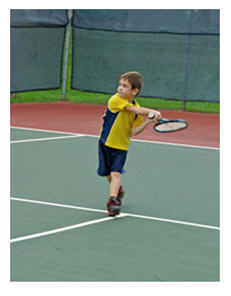How much competitiveness should we encourage in our children, and at what age? How competitive should we be with our kids?
Our go go go society
We know the tales of waiting lists, reference letters and expensive testing – all to get toddlers into the right preschools. Never too early to get our children properly “tracked” for the future, right?
The anxiety to do what’s best for our kids weighs on us. Preparing them for a competitive world – armed with all the advantages possible – is integral to the parenting process.
 Competitive at an early age
Competitive at an early age
Is it too much to expect three languages from a two-year old? Lessons in music, dance, and sports beginning by age three or four?
The desire to win at all costs is one we foster in this country; it is part of the “American ethos” – something worthy of both admiration and, at times, disdain. Theoretically, that determination to win is something we instill in our children in preparation for the real world. While competing effectively is a vital skill, I wonder how much is about them, and how much is for bragging rights, or to fill a void in ourselves.
Drawing the line
Kids under stress (like adults) are more susceptible to turning to unhealthy habits for comfort, whether they win or lose. Stress overload can push anyone to abusing cigarettes, alcohol, drugs, sex, food, sleeping pills. It’s not what we want for our children.
On the opposite end of the spectrum is lack of ambition. Without desiring something (which requires competitiveness), our kids are equally vulnerable to spending time in counterproductive ways.
Can you recognize when you are responding to a genuine desire in your child to pursue an activity? Can you recognize when you’re overloading your child – and yourself?
Take your cues from your kids
I can only speak (with any authority) about my own children, admitting that the jury is still out!
I’ve tried to follow three guidelines:
- Take cues from them – their personalities and interests
- Be a model for “always do your best”
- Recognize that choices are inevitable, and useful.
Have these guidelines worked in our household? I think so, and when life is as crazy and chaotic as ours has been, we’ve needed flexible guidelines, not hard-and-fast rules. I’ve also tried to show that’s it’s virtually impossible to be good at everything. Instead, excel at what you love, and in areas where you have natural talents. Then work it!
Childhood is short enough – let kids be kids!
Unlike the other parents I knew, I didn’t haul my little ones from activity to activity every day. It was a matter of conviction and logistics – four, five and six days a week of pre-planned activities were, in my opinion, too much pressure and too much scheduling for preschool and elementary-aged kids.
I gave each child a “one extracurricular activity” guideline. That was logistically viable, and also taught them to make choices. I wanted my kids to have time to “play” – to develop their imaginations, to be social and spontaneous, and to relax a little bit. Kids need time to be kids.
The result
Each of my children focused on what was of interest – changing frequently for my older son (tending toward academics and debate), and less so for my younger (arts and tennis, consistently). Tennis brought additional advantages (winning, losing, competing) but also meant more driving headaches for me. 
In the past two years of high school, competition has become a more serious issue – because of college applications and scholarships. Each has exhibited commitment, desire, and focus in key areas. We’ve reshaped our schedules and budget to accommodate more activities, though not everything they would’ve liked. Not possible! And that’s an issue for another day – parental guilt.
Competition among siblings
What about competition among siblings, particularly those close in age?
Kids compete for our attention (as parents), and they compete with each other. Some of it is natural; some of it is excessive, creating real problems of self-esteem.
My sons are competitive with each other. Fortunately, they have different friends and interests. Nonetheless, at times my younger son feels that he lives in the shadow of his older brother’s considerable accomplishments. And to some extent, he’s right.
How do I help, as a parent? I do my best to reinforce good sportsmanship between them, and to remind my younger that he excels in many areas.
Does it work? Not always. But kids can always benefit from hearing parents say they are loved, valued, and that we are proud of who they are, and what they are accomplishing.
Competition with parents
 When children are young, “letting them win” gives them a taste of victory, teaching an important lesson – the pleasure of winning. We also need to teach graceful losing. That comes as our children get a little older, and in part through our own actions. At what age do we stop letting them win? At what age do we accept that they win?
When children are young, “letting them win” gives them a taste of victory, teaching an important lesson – the pleasure of winning. We also need to teach graceful losing. That comes as our children get a little older, and in part through our own actions. At what age do we stop letting them win? At what age do we accept that they win?
Again, I’ve taken my cues from my kids, reflecting where they excel, where I excel, and their confidence and development. Whether it’s a scrabble game or a tennis game, they need to learn to win and lose. And when a child or teen legitimately beats a parent? It’s a memorable milestone, and source of pride.
No one right answer
Each child is different; each family dynamic is different. I do know what it was like to have a parent who competed with me in everything, including for the attention of my friends. I hated it.
As we begin to age, we may unconsciously compete with our kids, inappropriately – on appearance, physical performance in sports, or in areas of expertise where they begin to overtake us. Please don’t!
It’s hurtful. Allow your children – especially as pre-teens and teenagers – to own themselves. And to own their actions, their accomplishments, and their friends.
———–
We certainly went through a lot of too-busy periods and we had some brushes with the hyper competitiveness of the suburbs. (Pushy parents; evil kids.) When my son was announced valedictorian, we were the most surprised people in the room. We weren’t surprised by his abilities but we were surprised that one of the more competitive kids didn’t take the brass ring. After all, many kids set out to achieve class ranking and sacrifice all for that one goal.
Our son beat out another kid by a fraction, and that kid had an average that had been the highest at the end of the fall semester. Apparently, the father of the other student took it really hard and made the kid feel like a total failure. Ironically, both my son and the other student attended the same university and got along well. The other boy is now an MD, and my son teaches at an ivy league school.